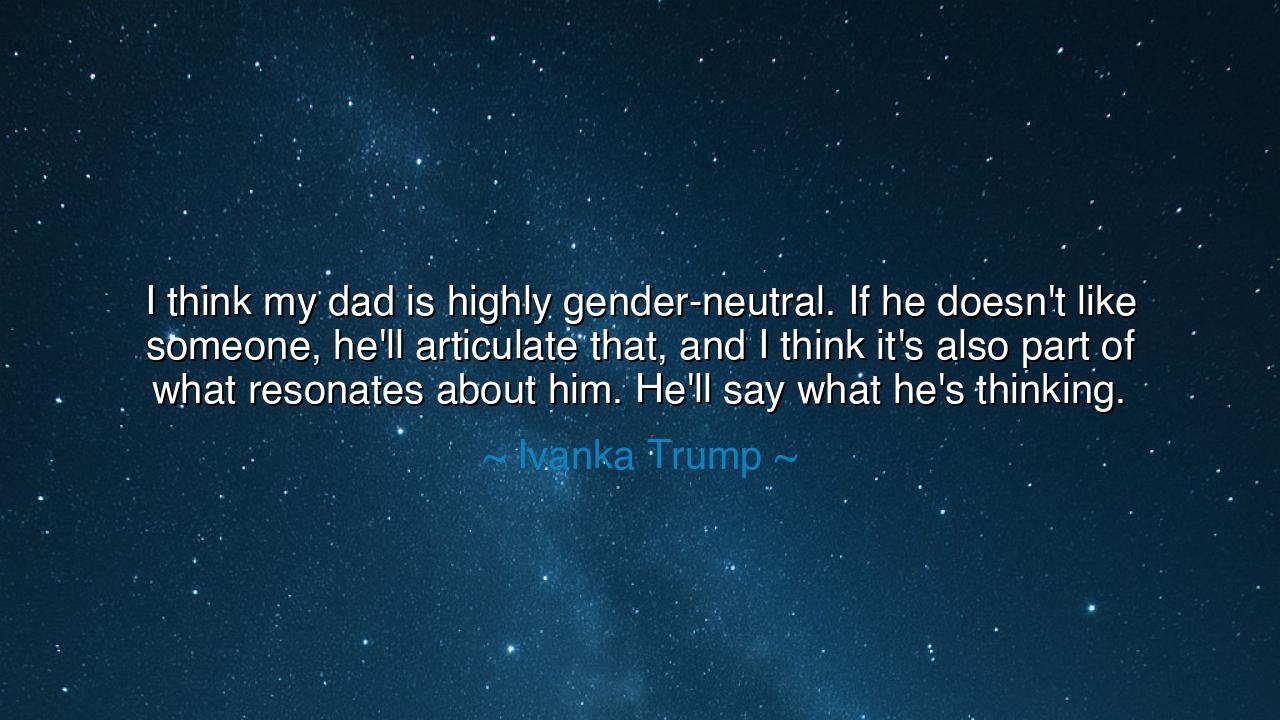
I think my dad is highly gender-neutral. If he doesn't like
I think my dad is highly gender-neutral. If he doesn't like someone, he'll articulate that, and I think it's also part of what resonates about him. He'll say what he's thinking.






In the words of Ivanka Trump, “I think my dad is highly gender-neutral. If he doesn’t like someone, he’ll articulate that, and I think it’s also part of what resonates about him. He’ll say what he’s thinking.” Beneath these modern words lies an ancient lesson about honesty, authenticity, and the courage to speak one’s truth without fear or favor. Ivanka’s reflection upon her father is more than a statement of character — it is an observation of a timeless principle: that truthfulness, though often unsettling, commands respect. To speak plainly, without the masks of bias or pretense, is to live in alignment with one’s inner conviction.
Ivanka Trump, in describing her father’s manner, captures a quality both admired and misunderstood through the ages — the boldness of those who refuse to disguise their thoughts behind the veil of diplomacy. When she calls him “gender-neutral,” she does not speak of politics, but of impartiality in judgment. Her father’s approval or disapproval, she suggests, is not swayed by status or identity, but by character and conduct. To articulate one’s truth, even when it may offend, is an act of both power and vulnerability. It is the way of those who would rather be sincere than adored, clear rather than cunning.
In the ancient world, such directness was revered as the mark of the wise. The philosopher Diogenes of Sinope, known for his blunt honesty, walked through the streets of Athens holding a lantern in broad daylight, declaring, “I am looking for an honest man.” He spoke truth to kings and beggars alike, scorning flattery and falsehood. Like Ivanka’s father, he did not measure people by title or gender, but by integrity. His life taught that authentic speech — even when uncomfortable — cuts through illusion and awakens others to reality. For though honeyed words please the ear, it is the sharp word of truth that strengthens the soul.
But such candor carries a burden. Those who “say what they’re thinking” must bear the consequences of their words. History shows that truth-tellers often stand alone. Socrates, condemned for “corrupting the youth,” spoke freely of virtue and wisdom in a society that preferred comfort to conscience. Yet his courage to speak truth, regardless of popularity, immortalized him. So too, Ivanka’s words remind us that unfiltered honesty — though it may invite criticism — is the mark of authenticity, a virtue rare and necessary in every age. To be loved for one’s image is fleeting; to be respected for one’s truth is eternal.
And yet, true articulation of thought is not cruelty. The wise speaker tempers honesty with wisdom and compassion. There is a difference between bluntness that wounds and truth that enlightens. The ancient teacher Lao Tzu warned, “He who speaks, knows not; he who knows, speaks not,” teaching that words carry power, and with power comes responsibility. Thus, those who speak their minds must do so with clarity of purpose, ensuring that their speech builds rather than breaks, reveals rather than ridicules.
The lesson in Ivanka’s reflection is therefore twofold: to speak truth without fear, but to do so with awareness. We must learn to honor the voice within that calls for honesty, while remembering that words, once released, cannot return. Speak not for applause, but for understanding. Say what you mean — yet mean it with care. The strength of one who articulates truth lies not in volume, but in conviction, not in dominance, but in integrity.
So, children of the present age, take this wisdom to heart: to live truthfully is to live freely. Do not disguise your thoughts in fear of judgment, nor flatter others to win their favor. Speak with sincerity, act with fairness, and judge others not by appearance, but by spirit. Like the father Ivanka describes, let your measure of others be based not on what they are, but on who they are. In this way, your words will carry both strength and justice, and your life will be marked by clarity rather than confusion.
Thus spoke Ivanka Trump, revealing a truth that echoes across centuries — that the power of honest speech is both rare and sacred. For in a world crowded with noise and masks, the voice that speaks plainly from the heart becomes a beacon. It may divide, but it also enlightens; it may unsettle, but it awakens. And those who wield such truth with courage and grace will forever stand among the few who are truly heard.






AAdministratorAdministrator
Welcome, honored guests. Please leave a comment, we will respond soon